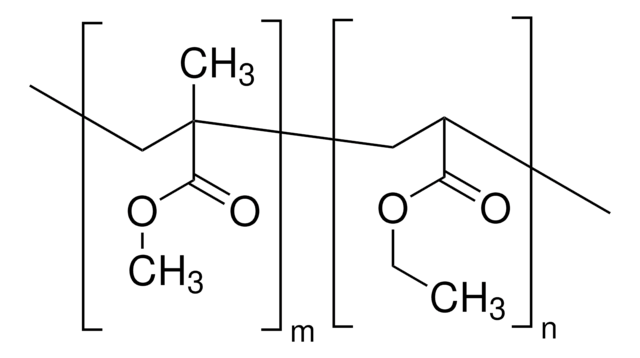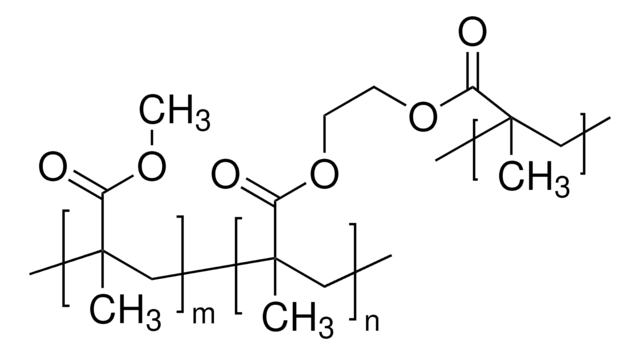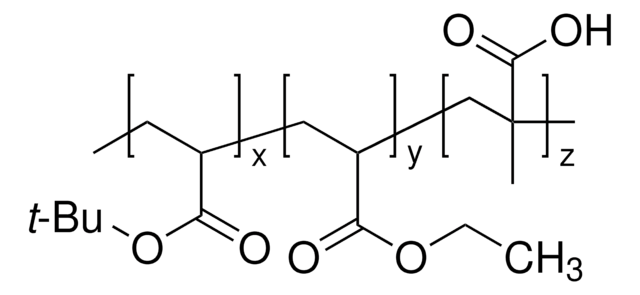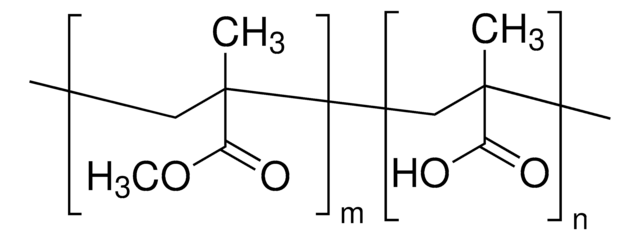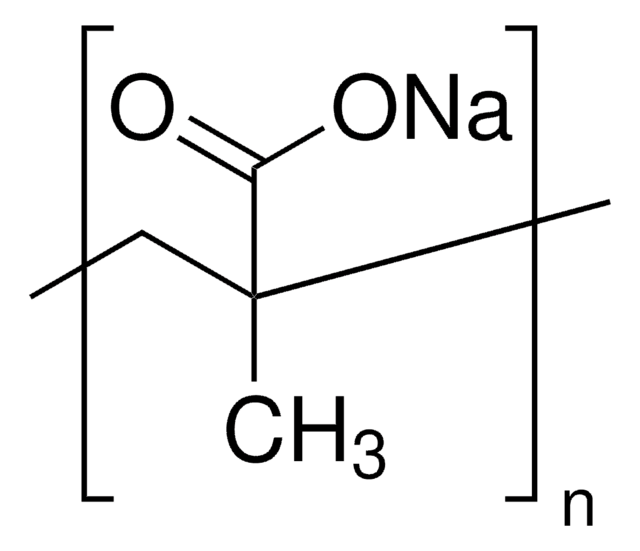376914
Poly(methyl methacrylate-co-methacrylic acid)
average Mw ~34,000 by GPC, average Mn ~15,000 by GPC
Synonym(s):
Poly(methacrylic acid-co-methyl methacrylate)
About This Item
Recommended Products
feed ratio
1:0.016 (methyl methacrylate:methacrylic acid)
mol wt
average Mn ~15,000 by GPC
average Mw ~34,000 by GPC
inherent viscosity
0.19 dL/g(lit.)
transition temp
Tg 105 °C
SMILES string
O(C)C(=O)C(=C)C.OC(=O)C(=C)C
InChI
1S/C5H8O2.C4H6O2/c1-4(2)5(6)7-3;1-3(2)4(5)6/h1H2,2-3H3;1H2,2H3,(H,5,6)
InChI key
IWVKTOUOPHGZRX-UHFFFAOYSA-N
Looking for similar products? Visit Product Comparison Guide
Related Categories
Application
- Ultrafine Nanoparticles of Poly(Methyl Methacrylate-co-Methacrylic Acid) Loaded with Aspirin: This study focuses on the preparation and potential therapeutic applications of biocompatible nanoparticles loaded with aspirin, highlighting their suitability for medical use (López-Muñoz et al., 2019).
- Biocompatible and biodegradable ultrafine nanoparticles of poly (methyl methacrylate-co-methacrylic acid) prepared via semicontinuous heterophase: Discusses the synthesis of biodegradable nanoparticles for potential biomedical applications, emphasizing their eco-friendly nature and suitability for drug delivery systems (Saade et al., 2016).
- Synthesis and characteristics of poly(methyl methacrylate‐co‐methacrylic acid)/poly(methacrylic acid‐co‐N‐isopropylacrylamide) thermosensitive semi‐hollow latex: Explores the unique properties of thermosensitive latex particles for advanced material applications, potentially useful in smart drug delivery systems (Lee et al., 2014).
- Preparation and release behavior of poly(methyl methacrylate-co-methacrylic acid)-based electrospun nanofibrous mats loaded with doxorubicin: Examines the use of polymeric nanofibers for controlled drug release, particularly for cancer treatment, demonstrating the versatility of poly(methyl methacrylate-co-methacrylic acid) in pharmaceutical applications (López-Muñoz et al., 2023).
Storage Class Code
11 - Combustible Solids
WGK
WGK 1
Flash Point(F)
Not applicable
Flash Point(C)
Not applicable
Personal Protective Equipment
Choose from one of the most recent versions:
Already Own This Product?
Find documentation for the products that you have recently purchased in the Document Library.
Customers Also Viewed
Articles
To keep pace with Moore′s Law, there is a continuing need in the semiconductor industry to achieve higher circuit density in microelectronic devices.
Self-assembled monolayers (SAMs) have attracted enormous interest for a wide variety of applications in micro- and nano-technology. In this article, we compare the benefits of three different classes of SAM systems (alkylthiolates on gold.
Global Trade Item Number
| SKU | GTIN |
|---|---|
| 376914-1KG | 4061831835441 |
| 376914-25G | |
| 376914-500G | 4061831835465 |
Our team of scientists has experience in all areas of research including Life Science, Material Science, Chemical Synthesis, Chromatography, Analytical and many others.
Contact Technical Service